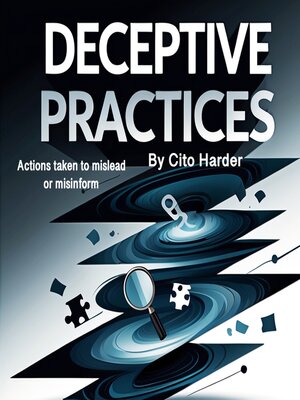
Sign up to save your library
With an OverDrive account, you can save your favorite libraries for at-a-glance information about availability. Find out more about OverDrive accounts.
Find this title in Libby, the library reading app by OverDrive.



Search for a digital library with this title
Title found at these libraries:
| Library Name | Distance |
|---|---|
| Loading... |
Deception has been a fundamental part of human interaction throughout history, shaping societies, relationships, and institutions. Whether through subtle manipulation, outright lies, or carefully crafted misinformation, deception influences decisions, perceptions, and behaviors in both personal and collective spheres. While often viewed negatively, deception is not always malicious; in some cases, it serves strategic, protective, or even necessary functions. Understanding the role deception plays in society requires examining its various forms, motivations, and consequences.
One of the most common areas where deception is prevalent is in personal relationships. People deceive for different reasons, ranging from self-preservation to maintaining social harmony. White lies, for example, are often used to spare feelings or avoid unnecessary conflict, while more harmful deceptions, such as infidelity or emotional manipulation, can cause deep and lasting damage. The complexity of deception in relationships highlights its dual nature—sometimes beneficial, sometimes destructive.
Beyond personal interactions, deception extends into professional and institutional environments. In workplaces, deceptive practices can manifest as misleading job descriptions, false performance evaluations, or office politics designed to manipulate outcomes. Deception in business, such as false advertising or hidden fees, can mislead consumers, erode trust, and cause financial harm. Similarly, political deception—through propaganda, misinformation, and strategic framing of facts—shapes public opinion, influencing elections, policies, and societal norms.







